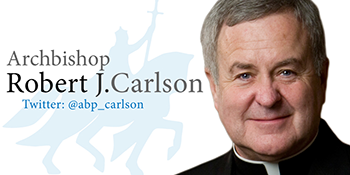
‘Do it again!” Children often say this when something delights
them. It’s also God’s approach to salvation history, and the readings
for Holy Week give several good examples.
This week we hear the
episode of Abraham and Isaac, in which the beloved son carries the wood
up the hill where he himself will be sacrificed. Then, we see Jesus do
it again in His Passion.
This week we hear about the “Suffering
Servant” from the prophet Isaiah: “But he was pierced for our offenses,
crushed for our sins; upon him was the chastisement that makes us whole,
by his stripes we were healed.” Then we see Jesus live these realities
again in His Passion.
This week we hear about the Passover in
which a lamb without blemish is sacrificed, its blood is sprinkled on
God’s people to protect them and its flesh is eaten. Then we see Jesus
live all these things again and bring them to fulfillment in His
Passion.
Many events in salvation history foreshadow the life of
Jesus. Many words in the prophets foretell what will befall Him. And
then, after those events and words have been fulfilled in the life of
Jesus, they’re re-echoed in our lives. The Israelites passed
figuratively from death to life through the waters of the Red Sea. Jesus
passed literally from death to life through the cross. Finally, we’re
joined sacramentally to Jesus through the waters of baptism, so that we
can die and rise with Him.
This is much more than a logical
argument for the existence of God. This is the whole pattern of history
pointing in the same direction. Much as a child delights in seeing
something done again, God delights in writing patterns into history over
and over so that we not only know that He exists, but know who He is
and what He wants for us.
So Jesus institutes the Eucharist, and tells us: “Do this in remembrance of me.” In other words, do it again.
He washes the disciples’ feet, and tells them: “As I have done for you, you also should do.” In other words, do it again.
Our
liturgical experience is like that, as well. The Triduum is an in depth
experience of the Passion, Death and Resurrection of Christ spread out
over three days. It’s deep, and intense, and beautiful. When we’re
finished with it, though slightly tired, we say: “Do it again!” And so
we do: every Sunday, in a smaller way, we walk through the Passion,
Death and Resurrection of Jesus. That’s why liturgists say that what the
Triduum is to the year, each Sunday is to the week.
I encourage
you, this week, to pay attention to the patterns God has written into
history, the patterns He has written into your own life, and the
opportunity to bring those things together in the liturgies of Holy
Week, especially the Triduum. Allow yourself to experience God’s delight
as we re-tell the events of salvation history, and you hear God say:
“Do it again!”